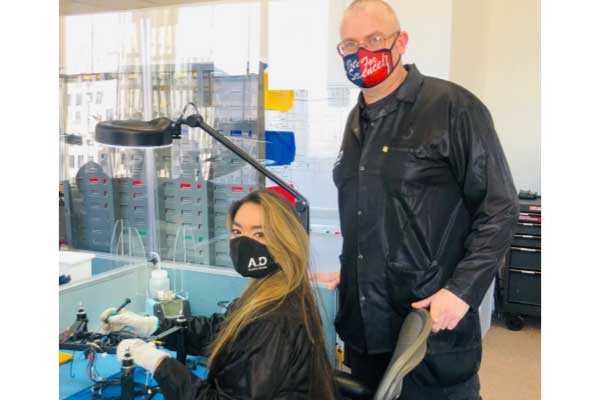A Bridgeport BMW car dealer is speaking out against the so-called “Tesla Bill,” which would allow electric vehicle manufacturers such as Tesla and Rivian to sell their automobiles directly to consumers.
 Tim Kraemer, executive vice president and general manager at BMW of Bridgeport, decried Senate Bill 127, “An Act Concerning the Sale of Electric Vehicles in the State,” as something whose passage would “hurt not only the auto industry, it will hurt the Connecticut consumer.”
Tim Kraemer, executive vice president and general manager at BMW of Bridgeport, decried Senate Bill 127, “An Act Concerning the Sale of Electric Vehicles in the State,” as something whose passage would “hurt not only the auto industry, it will hurt the Connecticut consumer.”
Speaking at a press event at his dealership at 43 North Ave. on March 22, Kraemer repeated past complaints by the nonprofit Connecticut Automotive Retailers Association that such statues would bypass Connecticut law and give such auto manufacturers an unfair advantage over existing dealerships.
“The lack of a dealer network to ensure sales assistance and post-sales support would take advantage of people buying directly from a manufacturer in the event of a product/service problem,” Kraemer said.
“Many current Tesla owners have shared stories about poor service and an inability to get service during nights and weekends. My mobile phone number is on our website and we are a 24/7 business because we live here and want to take care of our neighbors and fellow local business owners.”
Many of the state”™s statutes were passed as far back as the 1930s and were intended to protect independent auto dealers from auto manufacturers looking to own licensed dealerships and/or sell cars directly to consumers. Enacted when the American auto industry was dominated by the Big Three ”“ Ford, General Motors and Chrysler ”“ the laws are viewed as outdated by Tesla and others in an era when electric vehicles are becoming popular.
Connecticut is one of six states to bar direct sales by automobile manufacturers.
Tesla has been advocating for new legislation for the past several years.
Kraemer said that some 14,000 people are employed by the 270 new auto dealers in Connecticut, and that BMW of Bridgeport employs 109. In total, he said, Connecticut car dealers account for $10.3 billion in annual sales, or about 17.7% of all retail sales in the state. His own dealership pays $255,000 in taxes to Bridgeport, he said.
Kraemer was careful to point out that his and other dealers”™ opposition to SB 127 is not an opposition to electric vehicles (EVs), which he said are already making inroads on Connecticut roadways: There are approximately 45 EV choices at dealers across the state, he said, with 44 charging stations that can be utilized by the owner of any EV model.
Proponents of SB 127 say that the state is missing out on even more income. Tesla, which last year accounted for about 80% of EV sales, offers models priced from $36,990 to $200,000.
There is also the matter of the environment. As one of the states to sign on to the Zero-Emission Vehicle Memorandum of Understanding, Connecticut has committed to putting between 125,000 and 150,000 EVs on the road by 2025. As of Jan. 1, it has registered 13,800.
SB 127”™s cosponsors are state Sen. Will Haskell (D-Westport), Senate Chair of the Transportation Committee, and Rep. Jonathan Steinberg (D-Westport), a member of that committee.
Haskell, Steinberg and a coalition of other supporters appeared at the Westport train station March 22 to show their support for the bill.
“You can’t buy a Tesla, Lucid or Rivian without going to another state to make that purchase,” Haskell said. “I think Connecticut should do everything it can to make it easier to get behind the wheel of an electric vehicle, but instead our laws make it harder.
“Let”™s let consumers decide whether they want to buy from a car dealership or directly from an EV manufacturer,” he continued. “Dozens of other states have already tried this, and increased competition didn’t just lead to more EV sales and more EVs on the road, but it led to more jobs for dealerships and EV manufacturers alike. It”™s time to pass this bill.”
“Westport has the highest number of registered electric vehicles per-capita in the state of Connecticut, so our community is very committed to this,” First Selectman Jim Marpe said. “We have hybrid and electric vehicles in our police force and are committed to walking the walk as much as talking the talk.”
The town”™s “Sustainable Westport” hopes to reach net-zero emissions by 2050, Marpe said. “The way we get there is more electric vehicles in our community. We have 600; we need to get to 6,000, and the way we can do that more easily is to have showrooms allowing us to see and purchase those vehicles in a local fashion.
“I’m a free markets guy,” Marpe said, “and I think competition is good for everyone. Dealerships will rise to the occasion and make sure they have electric vehicle alternatives to sell as well. This is one way we get to the answer we’re all trying to get to.”
IBEW Union 488 Business Manager Daniel McInerney also spoke in favor of the bill, saying it would not only add more EVs to the roads but also create more jobs.
“Over the last six years, IBEW workers have earned over $200 million working on Tesla projects,” he said, “with another $200 million currently in the bidding process.
“This bill will lead to enormous opportunity for the most extensively trained and most skilled IBEW members and all state residents by accelerating the pace of our electric vehicle infrastructure development in Connecticut,” McInerney said.






















Dealerships are upset that their monopoly will soon be broken.
A few notes:
-Competition doesn’t hurt a Connecticut consumer!
-Tesla service lacks in-part because they have been shackled by the very dealers making this argument.
-Thankfully, more jobs come when there’s more competiton, and states that allow direct sales tend to have better job growth.
Having owned a Tesla Model 3 for a year and a half, I can attest to the fact that not having a local dealership has not been a problem for me. First, I didn’t have to go sit for hours in a dealership dickering over price and features. I bought my car online knowing exactly what I would get for what price and when I would receive it.
Secondly, on the two occasions when I had a minor problem with my car, I simply filled in a form on the screen in my car (or the app on my tablet). I promptly got a message offering several appointment dates/times and asking where the car would be at the chosen time. The only requirement was that if the weather was inclement that I provide a garage or covered space. A Tesla Ranger showed up with the necessary parts at my home and dealt with the issue.
Thirdly, I get regular (approximately monthly) updates over the air that fix problems I was unaware of and add features that I appreciate or ignore. All that is required is that I approve a time for the update to take place. It typically takes 25-30 minutes during which time I can’t drive the car.
I’ve owned Detroit iron for decades but never had this kind of service. I encourage Connecticut to join the 21st Century. This is the new way to receive prompt and effortless service.
The time of Stealerships is over. They are no longer needed or wanted in the modern-day. Bub-bye!